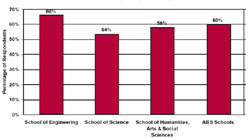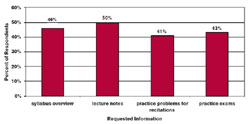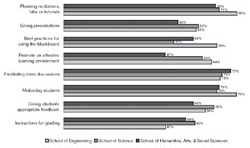| home this issue archives editorial board contact us faculty website |

| Vol.
XVII No.
5 May/June 2005 |
| contents |
| Printable Version |
Teach Talk
Strengthening TA Training
Approximately 900 teaching assistants - some of them undergraduates, but most of them graduate students - teach every year in the 23 departments at MIT. Many of these TAs have limited or no prior teaching experience, and many receive no formal training before entering the classroom.
Like many aspects of MIT life, support and training for TAs varies by discipline and department. Some departments, such as Chemistry and Biology, have orientations and on-going support for their TAs. For departments that don't offer such programs, the Graduate Student Office (GSO) and the Teaching and Learning Laboratory (TLL) organize a one-day orientation to the classroom at the beginning of the academic year. TLL also offers one-on-one support to interested TAs, but resources for that service have been limited. Ironically, TA training has become especially important in the last several years since initiatives to improve undergraduate education at MIT have led to many changes in technology and pedagogy. But because TAs themselves have often been taught in more traditional classroom settings, they may be even less comfortable using these new formats and tools.
How Well are TAs Trained?
Several efforts have been undertaken to assess the difficulties faced by TAs, and how those difficulties impact undergraduate education. In 2002, the undergraduate Student Committee on Educational Policy (SCEP) conducted a survey of undergraduates to assess their level of satisfaction with their TAs. The survey revealed: 1) students were unhappy with the inconsistency in teaching abilities of the TAs; 2) students were frustrated by discrepancies in what they are told by the instructor and what they are told by the TA; and 3) students were concerned about the inability of some TAs to communicate clearly.
Also in 2002, a committee of faculty, instructional staff, and students was called together by Dean for Undergraduate Education Robert Redwine to discuss how to better prepare TAs for the classroom. Committee members recognized that TAs are already under pressure to balance the demands placed on them to complete coursework, carry out their research, and teach. They realized, too, that support must be sensitive to the TAs' time schedules, create minimal extra work, and be flexible with respect to various disciplines. It was agreed that little information was known, other than through personal conversations and observations, about how TAs themselves feel about the level of support they receive, how they perceive their teaching ability, or whether they believe the level of training made available to them is adequate. Therefore, the committee asked TLL to survey TAs to get a clearer picture of their needs.
| Back to top |
Survey Identifies TA Training Needs
The TA survey was conducted in the spring of 2003. Three hundred and seventy-five TAs responded, over one-third of the TA population. The survey asked TAs about their previous teaching experiences, and what types of training and support services had been made available to them. It asked them to rank how effective or helpful the training and/or information had been. Lastly, the TAs were asked what types of training and support services they wanted.

Perhaps the most important finding was that graduate students view the TA experience as an integral part of their education. And perhaps the second most important finding was that "discussions with instructors" is the resource TAs look to first for information about teaching. As one TA commented in the survey, ".The TA experience hinges on the professor. Not only on how the TA interacts with the professor [but] also on how much support the professor gives the TA.."
Sixty percent of the survey respondents reported the instructor in charge of the course assisted them in preparing for their recitations or labs, and of the TAs who meet regularly with the instructor teaching the subject, almost 65% saw him/her either weekly or semi-weekly. That's the good news.
The bad news is that of the information TAs reported needing most from the instructor - lecture notes, syllabus overview, and practice exams - a relatively small percentage actually get that material. Only 38% of the respondents said they received an overview of the syllabus, 31% were given lecture notes, 22% were supplied with instructions for grading, and 21% got practice exams.

Another big obstacle respondents noted was a lack of clear communication between them and the faculty member. They are also frustrated about unrealistic expectations about the amount of work they are supposed to do, and that they received limited or no feedback on their performance throughout the semester. For example, one TA wrote, ".difficulties arose due to lack of communication between instructors, lab instructors, lab directors, and TAs. Each had different expectations of the students and the TAs."
Although respondents felt interactions and clear communication with the instructor were the key component to TA success, they did identify several ways in which training on how to teach would be helpful. When asked what kind of information they would find most useful, the following four topics were rated "very helpful" or "helpful" most frequently: motivating students (73%); facilitating class discussions (74%); planning recitations, labs, and tutorials (73%); and giving presentations (60%).

Guidance on these topics could be provided by department- or Institute-based workshops, but two-thirds of respondents reported their department currently did not offer teaching workshops. Those who had attended a workshop were evenly divided among those who thought it "very helpful" or "helpful" (33%); "somewhat helpful" (33%); and "only slightly helpful" or "not helpful at all" (33%). Thus, even when we do provide workshops for the TAs, it is clear we could do a better job with them.
The TAs said having an opportunity to meet with other TAs was also extremely important. Approximately 85% of those surveyed reported they either did not have the opportunity to meet with other TAs in their department, or they did not know if such opportunities existed. The respondents want to be able to learn and get advice from one another, and they said they often feel more comfortable with each other than a faculty member or a teaching consultant.
Finally, 34% of the respondents said their most preferred way of getting information about teaching would be from online resources. Because of the time pressures on them, accessibility to information that is fast and convenient is critical. Online resources are clearly a way to provide information to TAs that can be accessed on an as-need basis, and at a time that is most convenient for them individually.
| Back to top |
Plans to Improve TA Training
Those of us working on TA training recognize both the time restrictions faculty face and the mounting pressures on graduate students to successfully complete research. Therefore, in planning ways to strengthen TA training, we have carefully considered the time limits of the constituents as well as the need to tailor programs and services to the unique characteristics of departments and disciplines. Four new initiatives are in various stages of implementation.
Create/Maintain Department-Based Orientations.There are several advantages to introducing new TAs to their teaching roles in department-based orientations. The chance to meet other TAs and receive information specific to the department is an invaluable first step to creating community and support for graduate students, many of whom will be teaching for the first time. The department-based orientation should couple the opportunity to learn about and practice teaching skills with specifics about instruction in the particular discipline. After this initial introduction, TA peer groups could be established. As the TA survey revealed, creating opportunities for TAs to meet in a social environment to discuss teaching obstacles and strategies for overcoming them is critical.
Modify Institution-Wide Orientation. For departments that don't have the resources to organize a TA orientation, the Institute-wide orientation offered at the start of the academic year will continue. However, based on the feedback from the survey, we hope to modify the program to be more responsive to what the TAs have told us they need guidance on as, for example, motivating students.
Establish a TA Network. Many of the teaching and learning centers at our peer institutions have created networks so that one or more TAs in each department serve as a direct line of communication between TAs in that department and staff in the teaching and learning center. Our colleagues report that these networks are extremely effective in getting resources to TAs when they need them. The addition of a new position in TLL, the Associate Director for Teaching Initiatives, will help us to develop a similar network, as well as increase support for department orientations, enhance the Institute-wide orientation, and strengthen our capacity to work with individual TAs.
Develop Online Materials. TLL is partnering with Columbia University to develop a Web-based tool to help TAs teach better. The Teaching Assistant Strategy Kit, or TASK, is designed to supply TAs advice on teaching on a just-in-time basis. "Quick Tips" will answer specific questions and give users practical, concrete suggestions for how to teach to enhance learning, interact more effectively with students, and communicate more successfully with course instructors. Videos will demonstrate best practices and strategies to deal with common classroom challenges. "Dig Deeper" sections will afford users the opportunity to read about the research in learning that underpins the recommended tactics and practices, as well as point to more print and electronic resources. Thanks to the support from the Alumni-Sponsored Funds for Teaching and Education Enhancement and alumnus Stephen P. Kaufman (EECS '63), a prototype of the site will be available this summer.
We welcome additional thoughts on and recommendations for strengthening the teaching abilities of the Institute TAs.
| Back to top | |
| Send your comments |
| home this issue archives editorial board contact us faculty website |